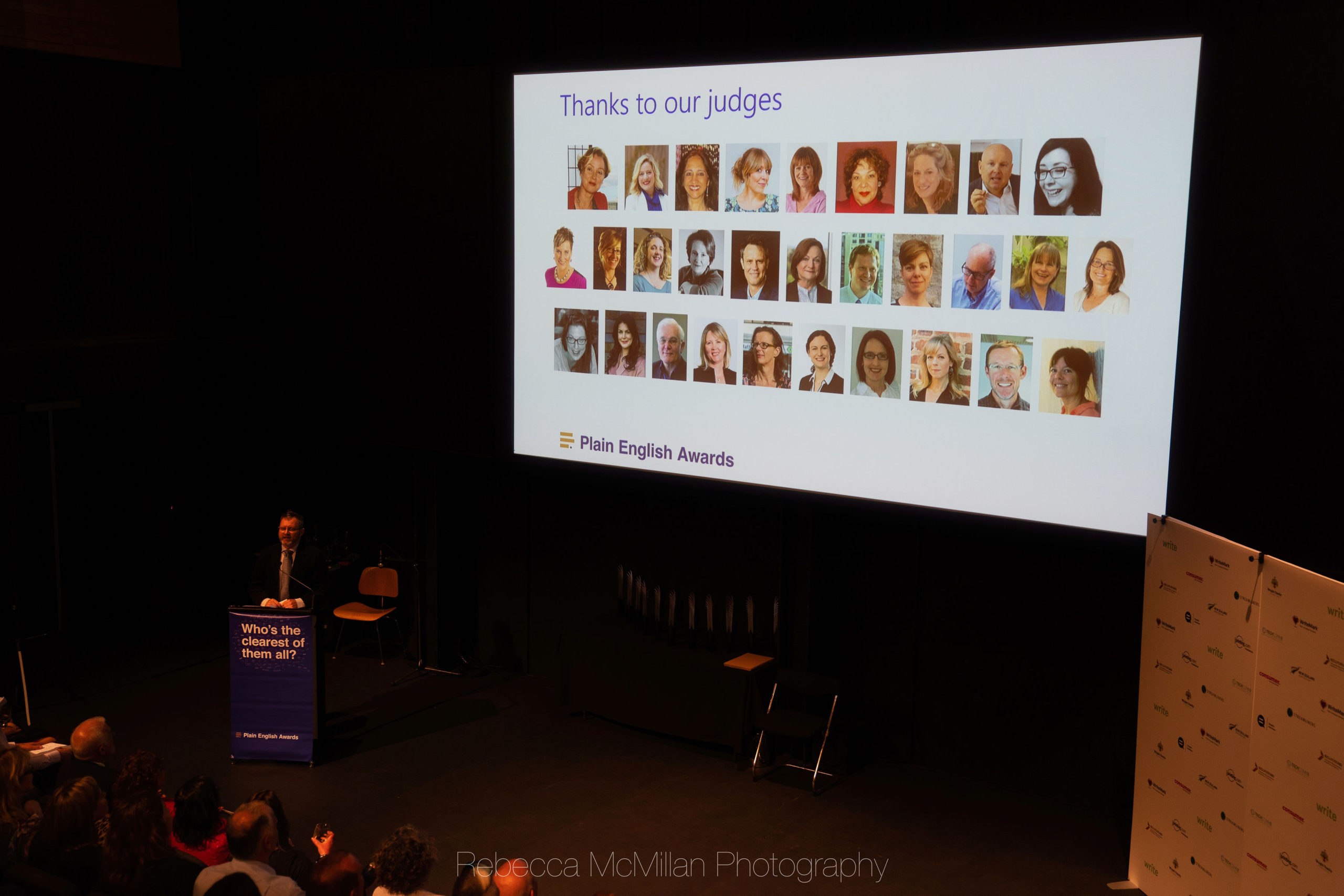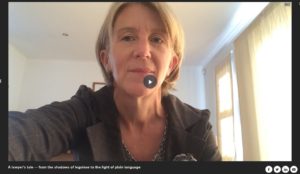
Thanking our judges at an Awards ceremony | Photo by Rebecca McMillan Photography
We asked our judges for some insider advice and tips to pass on to people considering entering the Awards.
And as usual, they were more than happy to help out!
We asked our judges:
- what aspects of an entry makes them think ‘this one is a winner’
- what their top piece of advice was for someone entering the Awards
- what common missteps they see that quickly let them know an entry won’t be a finalist
- what they thought were the most notable features of winning entries from past Awards.
This type of entry is a winner
One judge liked entries that surprised them and surpassed their expectations.
Others said, ‘First impressions are crucial. For me, if the structure is helpful and logical, the language simple and clear, and the tone friendly and engaging, then the authors will definitely be in the running to be winners’.
‘The language will be the equivalent of plain speaking — ordinary, everyday language throughout the text. The document will do the job the writer describes to us.’
‘I think for me that’s when I can feel that the writer has put the effort in to realise that they are writing for a reader. It might not be perfect, but you can tell that they are thinking about the receiver of the message.’
‘It’s how the authors weigh and balance the various aspects and elements of the communication — the audience and its needs, the situation and its urgency or characteristics, the political charge of the situation and people’s reaction, and how all of that has an impact on the message, tone, word choice, sentence construction, images — and when they tell me that they have talked to the intended audience, instead of just assuming they got it right. When all of these things are cohesive, I know I have a winner.’
‘Simplicity and clear evidence of designing the information for the audience.’
Our judges’ top pieces of advice
Our judges want entrants to put themselves in their readers’ shoes. They want you to forget about yourself and your message. Just ‘focus on your readers’, one said, and we agree. Your audience is, after all, what really matters.
Always put yourself in your readers’ shoes. You wouldn’t want to wade through dense, long-winded, jargon-filled reports. Neither do your readers!
Another common theme from our judges was:
Keep it simple!
Here are some other top tips from our judges.
- Don’t get in your own way.
- Leave your ego at the door.
- Brevity is the currency of good comms.
- Think outside of the box, talk to talk to your customers, ask them what they want and need, get to know them. And … surprise yourself!
- Avoid bureaucratic language, particularly impersonal, passive, or pompous sentences.
- Keep it short, sweet, and simple! (No one wants to read lots on a screen.)
- Make a human connection. Show that your piece reaches its audience and has results. Show that every decision was carefully made based on evidence, not assumptions. And even better, try to show documented results — fewer phone calls, more returned surveys, bills paid sooner.
Common missteps judges see in entries
Here’s more on what to avoid, with some examples from the judges of missteps in entries that didn’t make the grade.
Lack of focus on the intended reader
- Too much focus on their own story
- Using their company name over and over again, instead of using ‘us’ and ‘you’
- Text that suggested that the writer wanted the message or the organisation to seem important
Unclear purpose
- A lack of attention to the purpose of the entry. ‘With no ‘care’, probably no need to share…’
- Failing to talk about the goal of your piece in terms of what you want your audience to be able to do with the information
Language-related problems
- Using unfamiliar words in place of everyday words that most people will easily understand
- Too many words, repetition
- Vague language, jargon, or management clichés
Lack of testing or evaluation
- Not being able to show that you tested your piece with your intended audience, no matter how limited the testing
- Not being able to show how you used feedback to improve the document or website
Stronger editing or design needed
- Clumsiness in the writing
- Too much text and not enough white space
- Not being able to explain why you made a choice about design or word choice based on your intended audience.
- Overwriting — including information that just dilutes the purpose of the document — and a lack of tailoring
The most notable feature of past winning entries was putting the reader first
Judges all agreed that putting the reader first was the way to a winning entry. ‘Clarity and consideration of the audience’, said one judge.
Winning documents were thoughtfully and helpfully laid out, using clear and simple language, and in an engaging tone that inspired trust.
‘They all really moved into the heads of their readers’, one judge said. ‘What questions do they have? How can we answer those questions as clearly as possible? How can design help us? What tone of voice is needed?’
‘We have been unanimous in selecting entries that showed unusual skill, such as explaining bowel cancer with sensitivity and clarity. Others have explained complex topics in everyday language.’
‘I’ve only judged the Best Plain English Sentence Transformation before … ‘short and active’ were the two main ingredients!’
‘One of the most memorable entries I judged several years ago was a newsletter updating residents about a major road closure that was going to last several months. The details were highly technical; the inconvenience was very high for anyone who used the road. But the newsletter used similes and metaphors to explain the technical aspects; for example, ‘We need to remove the equivalent of two soccer arenas of rock’. The writer used humour and truth and, as a result, built the trust of those who read it. It could have been a boring weekly update, but instead was an engaging read in terms that even a non-engineer — who didn’t live anywhere near there — could understand. That was understanding the audience and the situation and creating something more.’
‘A conversational tone. And good design (white space, colour, graphics, and so on).’
Some extra wisdom from our judges
Our judges wanted entrants to enjoy the process. ‘The standard has been rising over time’, one said. ‘Even to be chosen as a finalist is impressive and should go in your CV. The ability to write in plain English is in demand around the world.’
Another judge added, ‘It’s a great way to get valuable personal feedback on your writing! And you support plain language for everyone, no matter what someone’s abilities or background are. A great cause.’
‘No matter the outcome for your entry this year, read the comments of the judges with interest. For the most part, they will give you insights on how to approach about your next communication in a richer way.’
‘Plain English is not an add-on to good business writing — it is good business writing.’
Read Trophy Tips: Top tips from past winners
Find out more about this year’s judges
Watch videos by some of our judges in our gallery
Nicola Welby July 5th, 2021
Posted In: 2021 Plain English Awards, Communications, Judges, Plain English Awards, Trophy Tips
Tags: clear communication, clear thinking, clear writing, Finalists, improved writing, insights, plain English, Trophy Tips Seminar, winners

Our judges explain why they love to be involved in the Plain English Awards | Photo by Anastasia Zhenina on Unsplash
When we surveyed our judges for their top tips for a winning Awards entry, we got some lovely feedback about why they love to judge the Awards. We thought you might like to read it too. Perhaps some of the thoughts here will inspire you to celebrate plain language in your own organisations. And you might feel more inclined to demand clear communication from the organisations you encounter in your daily life.
Our judges love celebrating the use of plain English
Our judges felt that that the Plain English Awards are a fantastic way of encouraging and celebrating plain language in organisations.
As an ardent supporter of clear writing, I’m delighted to support them.
I think we should encourage people to excel in this area.
It’s fun, interesting, and it helps me with my mission: plain language as a human right, world wide!
I’ve been leading workshops on writing in five countries for more than 30 years. Judging the competition has always seemed a natural complement.
I love what Write does and stand for and I think any opportunity to promote plain language is a good opportunity.
It’s incredibly important to recognise good writing in and by organisations because they serve as an example to other organisations. In addition, New Zealand’s Plain English Awards have been a model and inspiration for other awards. I learn so much each time I judge.
To help out the plain English community. To keep in touch with the standard of writing across Aotearoa. And I suppose it’s good to have my name connected with the Awards. It’s certainly ‘on brand’!
From the shadows of legalese to the light of plain language
One of our judges, Jacqueline Stephenson (now a legal and business proofreader and plain language editor), shares some reflections on her years as a practising lawyer in the UK and New Zealand. Why did she write the way she did? And what does plain language in legal writing mean to her now?

Watch Jacqueline Stephenson’s video in our gallery
Awards founder Lynda Harris asks us all to demand clear communication
When Lynda Harris spoke at the Awards ceremony in 2018, she encouraged everyone present to demand clear communication, whether as a writer or a consumer.
So, believing what you do about the power of plain language, my question to you as both writer and consumer is ‘what action can you take that is bigger and bolder than before?’ How can you make your sense of care count?
Read Lynda’s inspiring words from that speech in our 2-part blog.
Care — the shortcut to plain language (part 1 of Lynda’s speech)
Care into action — rewrite or reject! (part 2 of Lynda’s speech)
Anne-Marie Chisnall July 5th, 2021
Posted In: 2021 Plain English Awards, Communications, Judges, Plain English Awards
Tags: clear communication, democracy, improved writing, insights, judges, leadership, plain English, Trophy Tips Seminar

Will you join our prestigious list of winners? | Photo of 2018 Award winners by Rebecca McMillan Photography
We asked past Award winners what appealed to them about entering the Plain English Awards, what advice or feedback they got from the judges, and what tips they’d give to anyone entering this year.
We hope you find these tips useful!
We asked our winners:
- why entering the Awards appealed to them
- what features of their entry the judges appreciated the most
- what they would do differently if they entered the 2021 Awards
- what their top piece of advice was for this year’s entrants.
Why entering the Awards appealed to our past winners
- ‘We knew what we were doing was important and wanted to share that with other people who care about plain English.’ (Plain English Champion winner)
- ‘I met someone years before who’d entered and won an award, so for me it was a development goal to work towards. I wanted to become good enough, consistent enough and confident enough in what I do to deserve one of these awards. I also wanted to connect with people in similar roles to me and support and celebrate their achievements too.’ (Plain English Champion, Best Plain English Sentence Transformation winner)
- ‘I believe plain English is so important in society and I wanted to be a part of making change. I loved the challenge of making a technical document plain!’ (Best Plain English Document — private sector winner)
- ‘I think good technical communication deserves to be celebrated, and I love a challenge! Plus I thought that if I won, the award would look good on my desk and in my CV.’ (Best Plain English Technical Communicator winner)
The judges appreciated easy-to-read letters with a personal tone and clear design
The judges appreciated documents that were well structured and elegantly designed. They appreciated that a team effort often plays a part in improving communication. The judges also felt enthusiasm for plain English coming across in personal tone and were impressed by the entrants’ dedication to using both plain English and smart design to make their organisation’s communications clearer.
Judges also liked seeing great layout, and technical language explained clearly.
One winner said that the most powerful thing they did was include quotes from people on a benefit. ‘We had people thanking us for sending them easy to read and kind letters.’
Our winners said they could always find room for improvement
One said, ‘I’d take everything I’ve learnt since I last entered, and talk about that — the challenges, the new thinking, the lessons learned, the new responsibilities, and the successes.’
‘I would include more about the difference it made to people’, said another.
One entrant entered an instruction manual that was designed for the web, including drop-boxes that opened on click. As this was not a public-facing website, the entrant had to provide the content in Word, which wasn’t ideal. They said that in future they’d choose examples that they could provide in a more accessible format.
Our winners shared their top pieces of advice for someone entering the Awards
- ‘You have to really care about your entry and what you worked on.’
- ‘Structure your supporting evidence well, to make the value you’ve added to plain communication really clear and convincing for the judges.’
- ‘Design is as important as the plain English words used. Your layout is an integral part of plain English, as are any design features used.’
- ‘It sounds obvious, but make sure you read “What you need to know” for the category, and make sure you provide judges with everything they are looking for.’
Some more words of wisdom from our winners
Our winners agreed that ‘plain English is underrated, yet crucially important’. They also felt it was fantastic to be part of the plain English movement.
A plain English document can win your business customers, save readers valuable time, improve your organisation’s credibility, and even save lives.
The Awards recognise that it’s not always easy to keep things simple — our project was really daunting — but it’s so important.
The Awards have a really fantastic celebratory vibe. Even if you don’t win, it’s a great achievement to be a finalist and support other finalists, and to be part of an important movement in New Zealand.
Thanks to all our past winners for their valuable advice! We hope all our entrants get as much out of entering the Awards process as valuable as our past winners have!
Read Trophy Tips: In the words of our judges
Read about past award winners
How to enter the 2021 Plain English Awards
Nicola Welby July 5th, 2021
Posted In: 2021 Plain English Awards, Plain English Awards, Trophy Tips
Tags: clear communication, clear thinking, clear writing, Finalists, improved writing, insights, judges, plain English, Trophy Tips Seminar, winners





